Distributism is an economic theory asserting that the world's productive assets should be widely owned rather than concentrated. Developed in the late 19th and early 20th centuries, distributism was based upon Catholic social teaching principles, especially Pope Leo XIII's teachings in his encyclical Rerum novarum (1891) and Pope Pius XI in Quadragesimo anno (1931). It has influenced Anglo Christian Democratic movements, and has been recognized as one of many influences on the social market economy.

Humanae vitae is an encyclical written by Pope Paul VI and dated 25 July 1968. The text was issued at a Vatican press conference on 29 July. Subtitled On the Regulation of Birth, it re-affirmed the teaching of the Catholic Church regarding married love, responsible parenthood, and the rejection of artificial contraception. In formulating his teaching he explained why he did not accept the conclusions of the Pontifical Commission on Birth Control established by his predecessor, Pope John XXIII, a commission he himself had expanded.
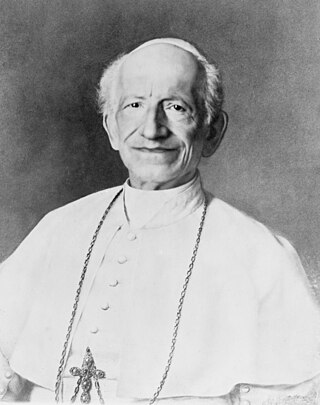
Pope Leo XIII was head of the Catholic Church from 20 February 1878 until his death in July 1903. Living until the age of 93, he was the oldest pope, whose age can be validated, holding office, and had the fourth-longest reign of any pope, behind those of St. Peter, Pius IX and John Paul II.
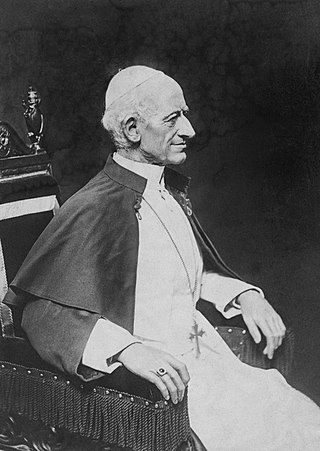
Rerum novarum, or Rights and Duties of Capital and Labor, is an encyclical issued by Pope Leo XIII on 15 May 1891. It is an open letter, passed to all Catholic patriarchs, primates, archbishops and bishops, that addressed the condition of the working classes.
An encyclical was originally a circular letter sent to all the churches of a particular area in the ancient Roman Church. At that time, the word could be used for a letter sent out by any bishop. The word comes from the Late Latin encyclios. The term has been used by Catholics, Anglicans and the Eastern Orthodox Church. Catholic social teaching has advanced 19 encyclicals.
Catholic social teaching (CST) is an area of Catholic doctrine which is concerned with human dignity and the common good in society. It addresses oppression, the role of the state, subsidiarity, social organization, social justice, and wealth distribution. CST's foundations are considered to have been laid by Pope Leo XIII's 1891 encyclical, Rerum novarum, which advocated distributism. Its roots can be traced to Catholic theologians such as Thomas Aquinas and Augustine of Hippo. CST is also derived from the Bible and cultures of the ancient Near East.

Maurice Roy was a Canadian Cardinal of the Roman Catholic Church. He served as Archbishop of Quebec from 1947 to 1981, and was elevated to the cardinalate in 1965.
Pacem in terris is a papal encyclical issued by Pope John XXIII on 11 April 1963, on the rights and obligations of people and their states, as well as proper interstate relations. It emphasizes human dignity and human equality in endorsing women's rights, nuclear nonproliferation and the United Nations.
Centesimus annus is an encyclical which was written by Pope John Paul II in 1991 on the hundredth anniversary of Rerum novarum, an encyclical issued by Pope Leo XIII in 1891. It is part of a larger body of writings, known as Catholic social teaching, which trace their origin to Rerum novarum and aim to relate the teachings of Jesus to the industrial age.
Mater et magistra is the encyclical written by Pope John XXIII on the topic of "Christianity and Social Progress". It was promulgated on 15 May 1961. The title means "mother and teacher", referring to the role of the church. It describes a necessity to work towards authentic community in order to promote human dignity. It taught that the state must sometimes intervene in matters of health care, education, and housing.
Laborem exercens is an encyclical written by Pope John Paul II in 1981, on human work. It is part of the larger body of Catholic social teaching, which traces its origin to Pope Leo XIII's 1891 encyclical Rerum novarum.
Exsul Familia is an apostolic constitution of Pope Pius XII on the topic of migration. It was released on 1 August 1952. The title of the document refers to the Holy Family, forced to flee into Egypt, taken as the archetype of every refugee family. Drawing upon Pope Leo XIII's Rerum Novarum, Exsul Familia presents emigration as a natural right.
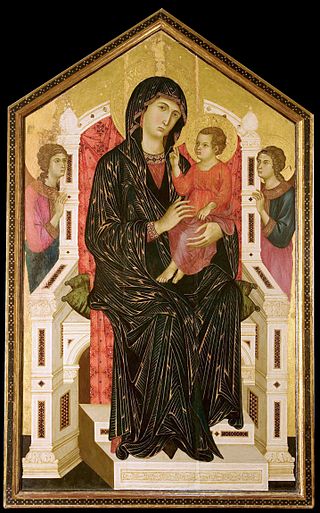
Mariological papal documents have been a major force that has shaped Roman Catholic Mariology over the centuries. Mariology is developed by theologians on the basis not only of Scripture and Tradition but also of the sensus fidei of the faithful as a whole, "from the bishops to the last of the faithful", and papal documents have recorded those developments, defining Marian dogmas, spreading doctrines and encouraging devotions within the Catholic Church.
Social teachings of the papacy encompass papal views described in social encyclicals and other papal communications, beginning with Rerum novarum, Pope Leo XIII's encyclical of 1891.
Le Sillon was a French political and religious movement founded by Marc Sangnier (1873–1950), which existed from 1894 to 1910. It aimed to bring Catholicism into a greater conformity with French Republican and socialist ideals, in order to provide an alternative to Marxism and other anticlerical labour movements.
Subsidiarity is an organizing principle that matters ought to be handled by the smallest, lowest or least centralized competent authority. Political decisions should be taken at a local level if possible, rather than by a central authority. The Oxford English Dictionary defines subsidiarity as the idea that a central authority should have a subsidiary function, performing only those tasks which cannot be performed effectively at a more immediate or local level.
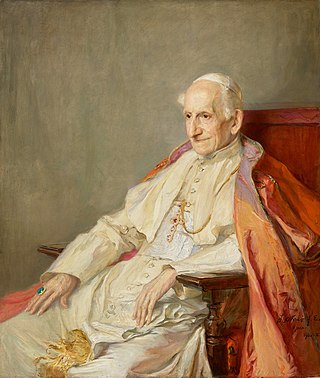
The theology of Pope Leo XIII was influenced by the ecclesial teachings of the First Vatican Council (1869-1870), which had ended only eight years before his election in 1878. Leo issued some 46 apostolic letters and encyclicals dealing with central issues in the areas of marriage and family and state and society.
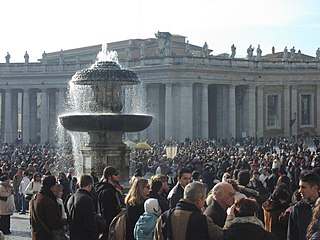
Catholic laity are the ordinary members of the Catholic Church who are neither clergy nor recipients of Holy Orders or vowed to life in a religious order or congregation. Their mission, according to the Second Vatican Council, is to "sanctify the world".








